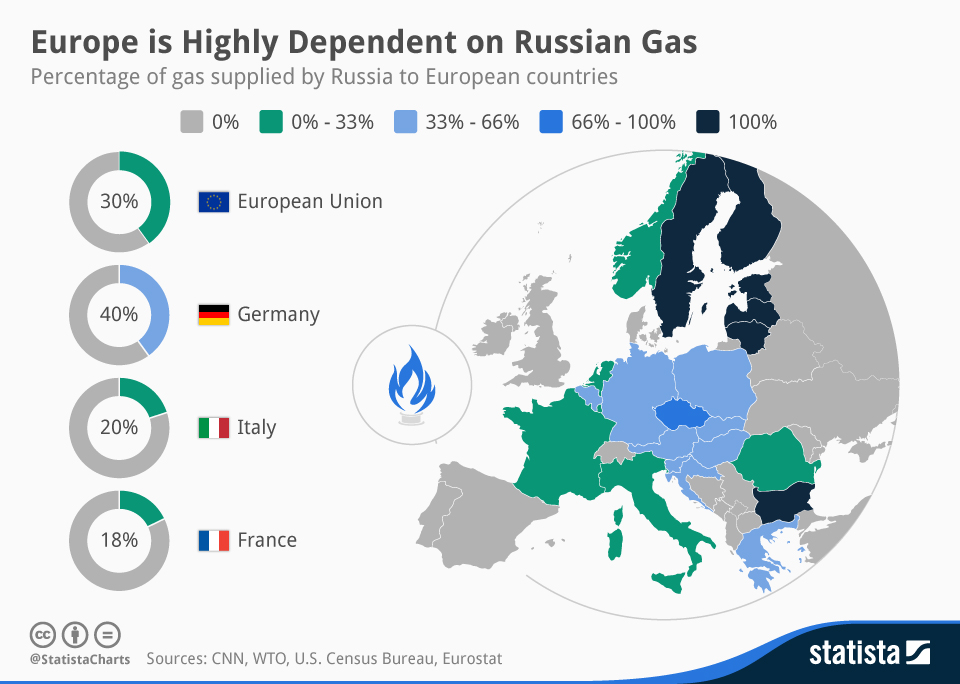
Article written by Maíra Figueredo Gomes and Marina Wohlers Ariboni
The European Union plans to reduce its dependence on Russian oil and gas by two-thirds by the end of the year and to zero by the end of the year. 2027, in view of the war between Russia and Ukraine and the desire to apply sanctions against Putin so that there is a possible cessation of military aggression by Russia against Ukraine. “The risk of stagnation will also depend a lot on the duration of the war”, said the EU economic commissioner, Paolo Gentiloni. they have committed to cut their carbon dioxide emissions by more than half by, Ursula von der Leyen, also stated that it will propose a plan to gradually eliminate dependence on Russian fossil fuels.
Russia is, currently, the world's largest oil exporter and the largest gas exporter to the European continent. not present moment, 45% of gases and 25% of the oil used by the member countries of the European Union are supplied by Russia, establishing an energy dependency.
In this context, Ursula von der Leyer wrote on Twitter “We are very dependent on Russia, especially the gas. We need to diversify supplies, mainly targeting LNG. We need to increase the share of renewable energy”, showing a certain concern.
The aforementioned punishments would be, no doubt, very impactful for Russia, as they target revenues from gas and oil exports to the European Union that help Moscow finance its war machine. The European Commission considers it extremely important to take this decision. However, it is very difficult to reach an understanding between the member states, since there is a strong energy dependence on some of them.
“The faster we switch to renewables and hydrogen, combined with more energy efficiency, the faster we will be truly independent and master our energy system […] I will work to implement them quickly with my team”, this from the Leyen.
This measure is extremely important for combating war.. still, impacts can be unavoidable, such as the rise in world oil prices. Therefore, the process of stopping Russian flows of fossil fuels must be done cautiously and gradually, as has been said by Ursula, since this European dependence on these Russian fuels is still very high. With this in mind, alternatives such as punitive tariffs or a price cap are under consideration. According to European sources, Brussels already plans to take short-term measures, as a possible emergency ceiling for energy prices and common stocks, to thereby, in 2027, finally stop using Russian oil and gases, essential objective of the European Union.
References:
ALDERMAN, Liz. Europe’s economy would be hit by a wider cutoff of Russian gas. The New York Times. 27 April 2022. Available in: <https://www.nytimes.com/2022/04/27/business/russian-gas-european-economy.html?searchResultPosition=4> Access in: 05 from May of 2022.
EU embargo on Russian oil likely to choke Moscow. DOP. 04 from May of 2022. Available in: <https://www.udop.com.br/noticia/2022/05/04/embargo-da-ue-ao-petroleo-russo-deve-sufocar-moscou.html> Access in: 05 from May of 2022.
MACCIONI, Federico. European Union plans to cease use of Russian oil and gas in 2027, says representative. CNN Brasil. 26 April 2022. Available in: <https://www.cnnbrasil.com.br/internacional/uniao-europeia-planeja-cessar-uso-de-petroleo-e-gas-russos-em-2027-diz-representante/> Access in: 03 from May of 2022.
EU discusses more sanctions on Russia, but oil and gas share the 27. Agency Brazil. 11 April 2022. Available in: <https://agenciabrasil.ebc.com.br/internacional/noticia/2022-04/ue-discute-mais-sancoes-russia-mas-petroleo-e-gas-dividem-os-2> Access in: 05 from May of 2022.
EU plans to phase out Russian fossil fuels by 2027. UOL News. 10 March 2022. Available in: <https://noticias.uol.com.br/ultimas-noticias/ansa/2022/03/10/ue-planeja-eliminar-combustiveis-fosseis-russos-ate-2027.htm> Access in: 04 from May of 2022.
